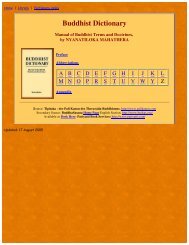The Three Basic Facts of Existence II: Suffering (Dukkha) - Buddhist ...
The Three Basic Facts of Existence II: Suffering (Dukkha) - Buddhist ...
The Three Basic Facts of Existence II: Suffering (Dukkha) - Buddhist ...
- No tags were found...
Create successful ePaper yourself
Turn your PDF publications into a flip-book with our unique Google optimized e-Paper software.
cultured, who suddenly dies and whose mental continuum guided by past kamma takes“birth,” is conceived in a womb. If memories <strong>of</strong> the past life persist, as seems to be the case atleast sometimes, how cramped will seem the tiny prison into which he has put himself! Howhelpless he will feel! If we consider the case <strong>of</strong> a being born from one <strong>of</strong> the realms <strong>of</strong> existencepurer than the human world then how much worse will seem his predicament. Accustomed forages to a subtle body, radiance, the convenience <strong>of</strong> immediate travel upon thought, purity andpleasant sense-experience, how will a former deva feel upon being confined to gross flesh,darkness, inability to move, impurity and painful sensations?After nine months (<strong>Buddhist</strong> works usually speak <strong>of</strong> ten) imprisonment during which “heundergoes excessive suffering being cooked like a pudding in a bag by the heat produced in themother’s womb,”, escape comes and the baby is ejected into the world. Never comfortable forthe mother, the time <strong>of</strong> parturition is agonising for the child, as Ācariya Buddhaghosa againsays, “that most fearful passage from the womb, like an infernal chasm, and lugged out throughthe extremely narrow mouth <strong>of</strong> the womb, like an elephant through a keyhole …”When newly born it is not surprising that the first sounds made by the baby are cries <strong>of</strong> pain.Newborn children are not seen to laugh or even smile, something which they learn to do muchmore slowly but they are very ready to wail—and with good reason too. “<strong>The</strong> Path <strong>of</strong>Purification” notes that “<strong>The</strong> pain that arises in him after he is born, and his body which is asdelicate as a tender wound, is taken into the hands, bathed, washed, rubbed with cloths, etc.,and which pain is like being pricked with needle points and gashed with razor blades—this isthe suffering rooted in venturing outside the mother’s womb.” To this must be added thesedays the doctor’s or midwife’s slap (to ensure inspiration) as further introduction to this painfulworld. So it is not surprising that babies cry, especially if we think about it in the clear light <strong>of</strong>dhamma, for in being born inevitably they must suffer all the rest <strong>of</strong> the formula which justbegins with “Birth is dukkha.” Of course, not all suffer in the same ways or in the sameproportions. But it is certain that wherever one gets birth, some kinds <strong>of</strong> suffering are sure t<strong>of</strong>ollow. As men, we must count ourselves fortunate (by having made good kamma) to have beenborn in a sphere which is called a “good born” (sugati) where there is, or can be, a fair amount <strong>of</strong>happiness.Everyone forgets being born—the memory <strong>of</strong> course is quickly overlaid—but then no onewishes to remember it. It is an event too painful physically and too distressing mentally,altogether too much fraught with dukkha.Having been born, one must decay. What a platitude this sounds! Yet those who are stillyoung try not to think <strong>of</strong> the various aspects <strong>of</strong> old age which would be disturbing to the searchfor pleasure, while those who are already in the clutches <strong>of</strong> old age usually find its embraceunwelcome in some ways.<strong>The</strong> word “jarā” does not only mean old age but has the wider meaning <strong>of</strong> ageing ordecaying. It has been said that decay begins at birth and this is true though the process <strong>of</strong>growth and renewal at that time disguises the process <strong>of</strong> decay. <strong>The</strong> latter is readily seen onlywhen it becomes the dominant process, usually when growing old but decay may also set in(due to disease or other factors) before a person is old in years, so we speak <strong>of</strong> prematureageing.But whenever or however it comes: “decay is dukkha.“ Decay is that unwelcome change alsocalled deterioration, and deterioration is the running down and falling apart which must takeplace in everything which is put together. All the compounded things <strong>of</strong> this world must decayand come eventually to destruction. Particularly, this body made up <strong>of</strong> various bits and pieces issure to deteriorate: this is dukkha for one who grasps at the body as “me” and “mine.” This7
















